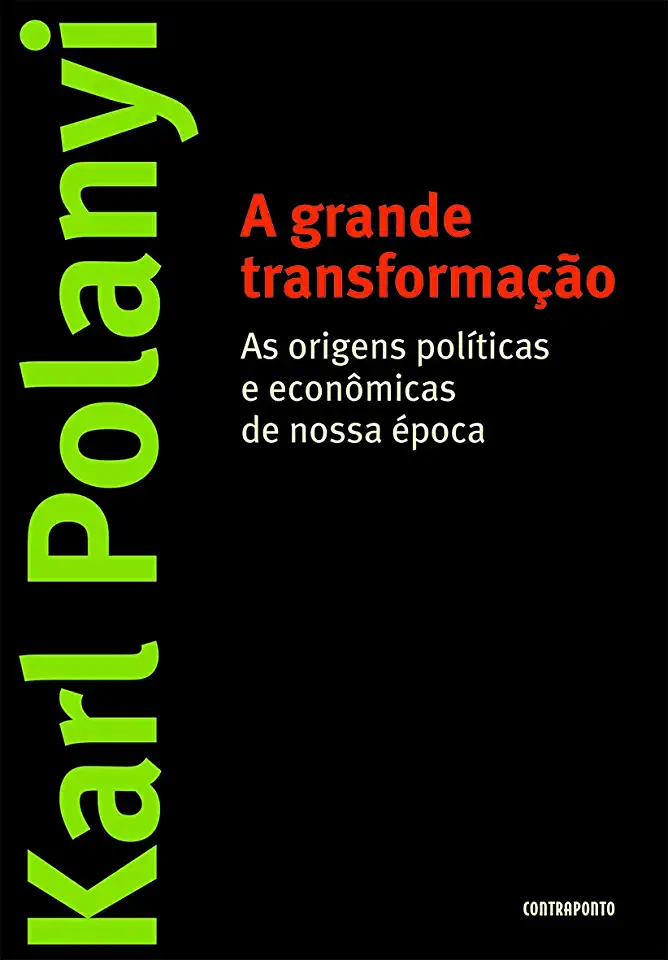
The Great Transformation - Karl Polanyi
The Great Transformation: The Political and Economic Origins of Our Time
In his seminal work, The Great Transformation, Karl Polanyi argues that the rise of industrial capitalism in the 19th century was a revolutionary break from the past that has had profound and lasting consequences for human society. Polanyi argues that the market economy, which is based on the principles of individual self-interest and competition, is inherently destructive of social solidarity and human well-being. He traces the origins of the market economy to the enclosure of the commons, the rise of the factory system, and the development of colonialism.
Polanyi argues that the market economy has led to a number of social and economic problems, including:
- The destruction of traditional communities: The market economy has destroyed traditional communities and social networks, leaving individuals isolated and vulnerable.
- The rise of inequality: The market economy has led to a widening gap between the rich and the poor.
- Environmental degradation: The market economy has led to the overexploitation of natural resources and the destruction of the environment.
- War and violence: The market economy has been a major cause of war and violence, as countries compete for resources and markets.
Polanyi argues that the market economy is not a natural or inevitable state of affairs, but rather a historical product that can be changed. He calls for a "great transformation" of society, in which the market economy is replaced by a more humane and sustainable economic system.
Polanyi's Critique of the Market Economy
Polanyi's critique of the market economy is based on the argument that the market is a disembedded institution that is not subject to social control. This means that the market is free to operate according to its own logic, which is based on the principles of individual self-interest and competition. This logic is destructive of social solidarity and human well-being because it leads to the commodification of labor, land, and money.
The Commodification of Labor
The commodification of labor means that labor is treated as a commodity that can be bought and sold on the market. This has led to the exploitation of workers, who are forced to work long hours for low wages in order to survive. The commodification of labor has also led to the rise of unemployment, as businesses are able to replace workers with machines.
The Commodification of Land
The commodification of land means that land is treated as a commodity that can be bought and sold on the market. This has led to the enclosure of the commons, which has deprived people of their access to land and resources. The commodification of land has also led to the concentration of land ownership in the hands of a few wealthy individuals.
The Commodification of Money
The commodification of money means that money is treated as a commodity that can be bought and sold on the market. This has led to the rise of the financial industry, which has become increasingly powerful and influential. The commodification of money has also led to the instability of the global financial system, which has caused economic crises and recessions.
Polanyi's Vision for a Great Transformation
Polanyi argues that the market economy is not a natural or inevitable state of affairs, but rather a historical product that can be changed. He calls for a "great transformation" of society, in which the market economy is replaced by a more humane and sustainable economic system.
Polanyi's vision for a great transformation is based on the following principles:
- The re-embedding of the economy in society: The economy must be re-embedded in society so that it is subject to social control. This means that the market must be regulated in order to protect workers, consumers, and the environment.
- The democratization of the economy: The economy must be democratized so that everyone has a say in how it is run. This means that workers must have a voice in the decisions that are made about their workplaces, and that consumers must have a say in the products that are produced.
- The localization of the economy: The economy must be localized so that it is more responsive to local needs. This means that businesses should be owned and operated by local people, and that they should produce goods and services for the local market.
Polanyi's vision for a great transformation is a radical departure from the current economic system. However, it is a vision that is worth fighting for, because it offers a more humane and sustainable way of life.
Conclusion
The Great Transformation is a powerful and provocative book that offers a unique perspective on the origins of our current economic system. Polanyi's critique of the market economy is devastating, and his vision for a great transformation is inspiring. This book is essential reading for anyone who is interested in understanding the world we live in and how it can be changed.
Enjoyed the summary? Discover all the details and take your reading to the next level — [click here to view the book on Amazon!]